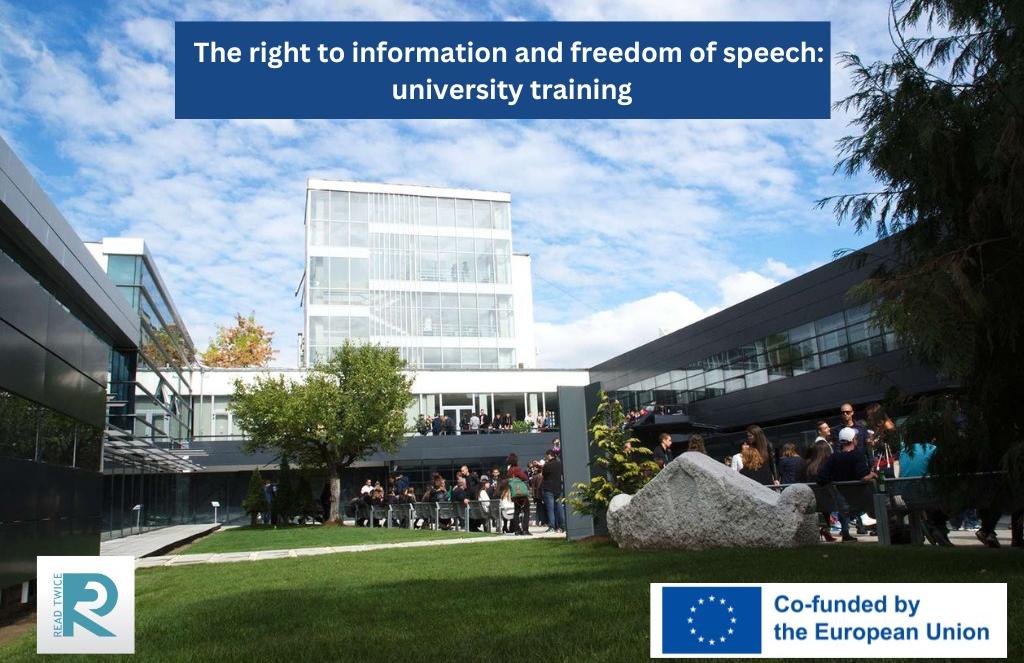Thessaloniki gets ready for its metro launch in November
The underground rapid transit lines have been under construction for almost two decades due to various project delays
 TheMayor.EU logo
TheMayor.EU logo 
The opening of the academic year at New Bulgarian University, Source: НБУ фото on Wikipedia, CC BY-SA 3.0 with added logos and title
Stage two: Bulgarian media professionals seek to boost media literacy in their home country with skills they've acquired in Germany and Portugal
On 18 April, the Read Twice project will hold the first of its several educational trainings, as part of its mission to tackle online disinformation and gaps in media literacy. The mentors, young media professionals from Bulgaria, will lead the session at the New Bulgarian University in the capital city of Sofia.
The educational workshop is titled ‘Right to information and free speech: Disinformation in the age of digital media’ and it will focus on what project participants have learned in Porto and Berlin from experts of Alliance4Europe, LUSOFONA University, Der Spiegel, Publico and Deutsche Welle among others.
Read Twice is a project funded by the EU’s C.E.R.V. programme (Citizens, Equality, Rights and Values) and aims to spread media literacy and anti-disinfo practices from countries in the EU, which are more experienced in handling disinformation issues and have more robust media culture, to countries which are still searching for better ways to resist disinformation.
In particular, the project wants to develop and train 30 young media professionals from Bulgaria, Romania and Croatia, three countries that rank among the lowest in terms of media literacy, according to the 2021 Media Literacy Index, published by the Open Society Foundation.
Now that the initial capacity-building activities are complete, these professionals will spread their new experience to their peers in their home countries, through special training sessions in local universities.
As a first step, students will have a chance to learn how social media contributes to the spread of harmful content and who has a vested interest in the spread of fake news. Moreover, the training will also focus on the effects of disinformation on human rights, including the right to be informed.
Additionally, the training team will introduce the public to some of the most effective contemporary instruments for detecting false information, including Crowd Tangle, the DISARM Framework and Public Editor.
These can be used at a variety of levels, be they institutional, professional, or even personal.
Similar events are scheduled to take place at Sofia University, Bulgaria, in Zagreb (Croatia) and Bucharest (Romania).

The underground rapid transit lines have been under construction for almost two decades due to various project delays

Now you can get your wine in Talence by paying directly in Bitcoin

That’s because the state has to spend money on updating the railway infrastructure rather than subsidizing the cost of the popular pass

Rethinking renewable energy sources for the urban landscape

The examples, compiled by Beyond Fossil Fuels, can inform and inspire communities and entrepreneurs that still feel trepidation at the prospect of energy transition

Now you can get your wine in Talence by paying directly in Bitcoin

The 10th European Conference on Sustainable Cities and Towns (ESCT) sets the stage for stronger cooperation between the EU, national and local level to fast track Europe's transition to climate neutrality.

At least, that’s the promise made by the mayor of Paris, Anne Hidalgo

The underground rapid transit lines have been under construction for almost two decades due to various project delays

At least, that’s the promise made by the mayor of Paris, Anne Hidalgo

Hostal de Pinós is located in the geographical centre of the autonomous region

Despite its church-y name, the district has long been known as the hangout spot for the artsy crowds

Urban dwellers across the EU are having a say in making their surroundings friendlier to people and the environment.

Forests in the EU can help green the European construction industry and bolster a continent-wide push for architectural improvements.

Apply by 10 November and do your part for the transformation of European public spaces

An interview with the Mayor of a Polish city that seeks to reinvent itself

An interview with the newly elected ICLEI President and Mayor of Malmö

A conversation with the Mayor of Lisbon about the spirit and dimensions of innovation present in the Portuguese capital














